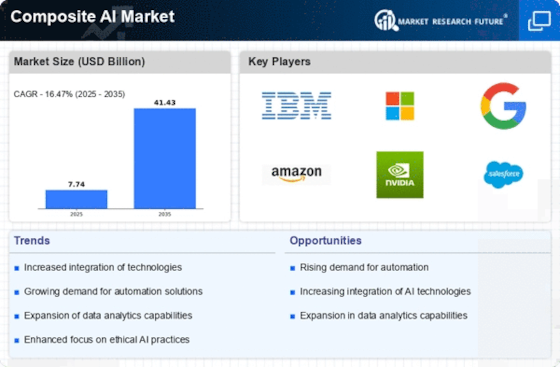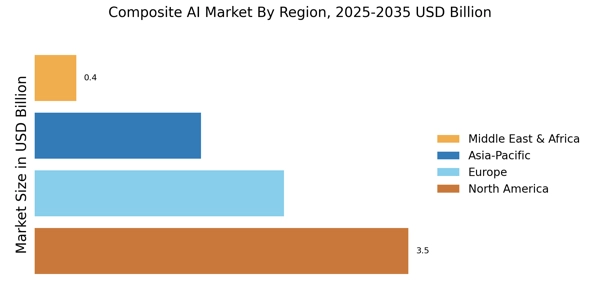Emergence of Hybrid AI Models
The Composite AI Market is experiencing a notable shift towards the emergence of hybrid AI models that combine various AI techniques. These models leverage the strengths of different methodologies, such as symbolic AI and machine learning, to create more robust and versatile AI systems. This trend is particularly relevant as organizations seek to address complex challenges that require multifaceted solutions. The hybrid AI approach is expected to enhance the adaptability and performance of composite AI systems, making them more appealing to businesses across diverse sectors. As the demand for innovative AI solutions grows, the Composite AI Market is likely to benefit from the proliferation of hybrid AI models.
Rising Demand for Enhanced Decision-Making
The Composite AI Market experiences a notable surge in demand for enhanced decision-making capabilities across various sectors. Organizations increasingly seek to leverage advanced AI technologies to improve operational efficiency and strategic planning. This trend is particularly evident in industries such as finance and healthcare, where data-driven insights can lead to significant competitive advantages. According to recent estimates, the integration of composite AI solutions could potentially enhance decision-making processes by up to 30%, thereby driving growth in the Composite AI Market. As businesses recognize the value of informed decision-making, investments in composite AI technologies are likely to escalate, further propelling market expansion.
Advancements in Machine Learning Techniques
The Composite AI Market is significantly influenced by advancements in machine learning techniques. Innovations in algorithms and computational power enable the development of more sophisticated AI models that can process and analyze vast amounts of data. These advancements facilitate the integration of various AI methodologies, such as deep learning and reinforcement learning, into composite AI systems. As a result, organizations can achieve higher accuracy and efficiency in their AI applications. The market for machine learning is projected to grow at a compound annual growth rate of over 40%, indicating a robust environment for the Composite AI Market. This growth is likely to attract further investments and research, enhancing the capabilities of composite AI solutions.
Increased Focus on Automation and Efficiency
The Composite AI Market is witnessing an increased focus on automation and efficiency as organizations strive to optimize their operations. The integration of composite AI technologies allows businesses to automate complex processes, reducing the need for manual intervention and minimizing errors. This trend is particularly prominent in manufacturing and logistics, where operational efficiency is paramount. Reports suggest that companies implementing composite AI solutions can achieve up to a 25% reduction in operational costs. As organizations continue to prioritize efficiency, the demand for composite AI technologies is expected to rise, driving growth in the Composite AI Market.
Growing Importance of Data Privacy and Security
The Composite AI Market is increasingly shaped by the growing importance of data privacy and security. As organizations adopt composite AI solutions, they must navigate complex regulatory environments and ensure compliance with data protection laws. This focus on privacy and security is particularly critical in sectors such as finance and healthcare, where sensitive data is prevalent. The market for data privacy solutions is projected to reach several billion dollars, indicating a strong demand for secure composite AI systems. Consequently, companies that prioritize data security in their composite AI offerings are likely to gain a competitive edge in the Composite AI Market.

















